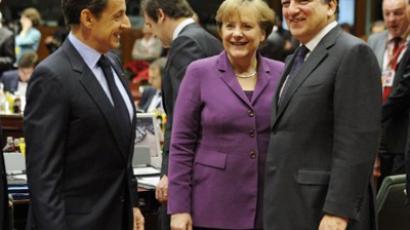Eurozone downgrade: Is collapse imminent?
European leaders are rushing to contain the fallout after S&P downgraded nine of the seventeen eurozone members. But while many across Europe promise further reforms, is a eurozone breakup a done deal?
Speaking with reporters and analysts after the cuts, Standard & Poor's predicted a eurozone recession, saying that GDP could contract by 1.5 per cent in 2012.France, the eurozone’s second largest economy, was downgraded from its AAA credit rating to AA+ and could face further cuts unless it manages to curb inflationary pressure on its debt and budget deficit.In response, the French Prime Minister Francois Fillon said on Saturday that his country would push ahead with cost-cutting measures in reaction to the S&P cut.Apart from France, Austria, Malta, Slovakia and Slovenia were also downgraded one notch, while Cyprus, Italy, Spain and Portugal suffered double-notch declines.Austria, which lost its AAA rating, viewed the downgrade as a wake-up call to curb its debt and get its financial house in order.However, other European nations strongly criticized Friday’s deluge of downgrades, arguing the move could hamper already embattled countries’ ability to borrow money, reduce debts, and avoid a deepening of the crisis.But while German Chancellor Angela Merkel hoped the downgrade would spur the signing of a “financial compact” between member states that could help save the single currency, John Laughland, director of studies at the Institute for Democracy and Cooperation, told RT that Friday’s downgrade would go down as the beginning of the end for the euro.“I think when the euro finally collapses as it will do surely, probably within the next year, we will see this day, this announcement, the downgrading of France, as having been one of the decisive moments, because it really is a sign that the markets are losing confidence in the eurozone and the euro-project as a whole, and in the core countries in Europe,” he said. Laughland further argues that despite promises reign in debt, the euro itself is ultimately to blame for the deepening economic crisis.“Apart from the inherit contradictions of the euro itself, this debt issue is not something that the euro has failed to control, it has actually been caused by the euro. The reason why we have a debt problem in the eurozone is that the countries, particularly in southern Europe, who have run up enormous debts, have been able to do so without feeling the consequences in terms of exchange rates. In a normal situation, if they had had national currencies, their currencies would have lost value. It is precisely because they have a shared currency that they have the impression that they could have a sort of free lunch for so long. And that’s what’s got us into the situation that we’re in.”














